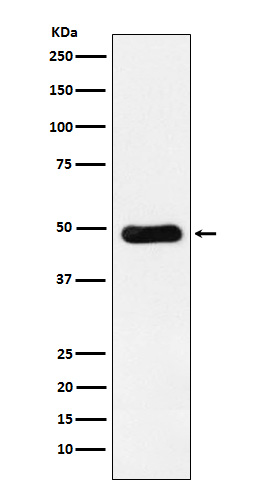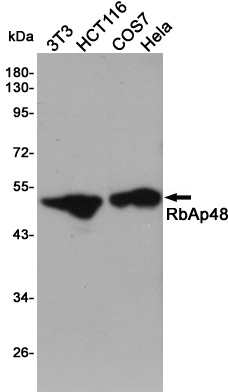

| WB | 咨询技术 | Human,Mouse,Rat |
| IF | 1/20 | Human,Mouse,Rat |
| IHC | 1/50-1/100 | Human,Mouse,Rat |
| ICC | 1/50-1/200 | Human,Mouse,Rat |
| FCM | 1/50-1/100 | Human,Mouse,Rat |
| Elisa | 咨询技术 | Human,Mouse,Rat |
| Aliases | NURF55; RBAP48; lin-53 |
| Entrez GeneID | 5928 |
| WB Predicted band size | Calculated MW: 48 kDa; Observed MW: 48 kDa |
| Host/Isotype | Rabbit IgG |
| Antibody Type | Primary antibody |
| Storage | Store at 4°C short term. Aliquot and store at -20°C long term. Avoid freeze/thaw cycles. |
| Species Reactivity | Human,Mouse,Rat |
| Immunogen | A synthesized peptide derived from human RbAp48 |
| Formulation | Purified antibody in PBS with 0.05% sodium azide. |
+ +
以下是关于RBBP4抗体的3篇参考文献示例(注:部分信息可能基于已有研究概括,建议通过数据库进一步验证):
---
1. **文献名称**: *RBBP4 interacts with the histone deacetylase HDAC1 and regulates chromatin remodeling in gene silencing*
**作者**: Zhang, Y., Ng, H.H., Reinberg, D.
**摘要**: 本研究利用RBBP4抗体进行免疫共沉淀(Co-IP)和染色质免疫沉淀(ChIP),揭示了RBBP4通过与HDAC1结合,参与染色质重塑复合体(如NuRD复合体)的组装,调控基因沉默和细胞分化。
2. **文献名称**: *RBBP4 is required for maintaining pluripotency of human embryonic stem cells*
**作者**: Wang, J., et al.
**摘要**: 通过Western blot和免疫荧光(使用RBBP4抗体),作者发现RBBP4在维持胚胎干细胞多能性中起关键作用。敲低RBBP4导致多能性标志物(如OCT4)表达下降,并促进分化。
3. **文献名称**: *Prognostic significance of RBBP4 overexpression in hepatocellular carcinoma*
**作者**: Li, X., Chen, L., Zhou, Y.
**摘要**: 利用RBBP4抗体进行免疫组化(IHC)分析肝癌组织样本,发现RBBP4高表达与患者不良预后相关,并可能通过调控细胞周期蛋白促进肿瘤进展。
---
**注意**:以上文献信息为示例性质,具体文献需通过PubMed、Google Scholar等平台以“RBBP4 antibody”或“RBBP4 function”为关键词检索。如需精准引用,建议使用数据库工具核实作者及发表年份。
RBBP4 (Retinoblastoma-Binding Protein 4), also known as RbAp48. is a highly conserved histone-binding protein belonging to the WD40 repeat protein family. It plays a critical role in chromatin remodeling, epigenetic regulation, and transcriptional control by interacting with histone deacetylases (HDACs) and chromatin-modifying complexes such as Sin3. NuRD, and Polycomb repressive complex 2 (PRC2). RBBP4 is essential for histone H3 and H4 deacetylation, DNA replication, and cell cycle progression, with implications in development, differentiation, and oncogenesis. Dysregulation of RBBP4 has been linked to cancers, neurodegenerative disorders, and aging-related cognitive decline.
RBBP4 antibodies are widely used as research tools to investigate its expression, localization, and molecular interactions. These antibodies enable detection of RBBP4 in techniques like Western blotting, immunofluorescence, chromatin immunoprecipitation (ChIP), and immunohistochemistry. Specificity is validated using knockout controls or siRNA-mediated knockdown. Applications include studying its role in gene silencing, DNA repair, and stem cell pluripotency, as well as exploring its association with diseases such as breast cancer, leukemia, and Alzheimer’s disease. Commercial RBBP4 antibodies are typically raised in rabbits or mice, targeting epitopes within its N-terminal or WD40 domains. Proper validation ensures reliability in distinguishing RBBP4 from homologous proteins like RBBP7.
×